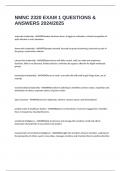NMNC 2320 EXAM 1 QUESTIONS &
ANSWERS 2024/2025
autocratic leadership - ANSWERSmakes decisions alone, struggle in motivation, minimal recognition of
staff, effective in crisis situations
democratic leadership - ANSWERSpeople oriented, focused on group functioning, perceived as part of
the group, constructive criticism
Laissez-faire leadership - ANSWERSpermissive with little control, staff can make and implement
decisions, little to no direction, limited criticism, motivates by support, effective for highly motivated
groups
transactional leadership - ANSWERSfocus on tasks, use trade-offs with staff to get things done, use of
rewards
transformational leadership - ANSWERStransforms individuals, identifies common values, inspiration and
stimulation of others, empower others, long term vision
types of power - ANSWERScoercive, legitimate, referent, reward, expert, and informational
positive traits of healthcare leaders - ANSWERSperson-centeredness, front line engagement, relentless
focus, transparency, boundarilessness,
emotional intelligence - ANSWERSable to perceive and manage the emotions of self and others
(important characteristic of successful nurse leader)
characteristics of emotional intelligence - ANSWERSinsight into emotions of team members, understand
the perspective of others, open to new ideas, manages emotions and channels them in positive direction
, characteristics of productive teams - ANSWERSopen and honest communication, ability to work with
others who have different skill levels, emotional/mental stability, common team goal, mix of
complementary skills/experience
what is needed to build an effective team - ANSWERSa deliberate process of unifying a group of people
into one unit to address specific goals, interpersonal skills, problem solving, technical/functional
expertise
stages of group formation - ANSWERSforming, storming, norming, performing, and adjourning
dysfunctional group personalities - ANSWERSself-servers, critical conservatives, motor mouths, mouse
self-servers - ANSWERSrules of the group do not apply to them
critical conservative - ANSWERScriticize every suggestion
motor mouths - ANSWERStalk just to hear themselves
mouse - ANSWERSsilent observer fearful of voicing an opinion
types of followers - ANSWERS1.) effective, 2.) alienated, 3.) yes follower, 4.) partner follower, 5.)
contributor follower, 6.) politician follower, 7.) subordinate follower
passive style of communication - ANSWERSlet others push them around, do not stand up for themselves,
do what they are told regardless of how they feel, not able to share feelings or needs
aggressive style of communication - ANSWERSa person puts their own needs, rights, feelings;
communicates in dominating way; perceived as threatening, punishing, demanding or hostile
assertive style of communication - ANSWERSa person knows how to stand up for themselves in a
manner that does not violate the rights of others, expresses feelings in honest and direct manner, does
not let others take advantage of them, takes responsibility for actions




